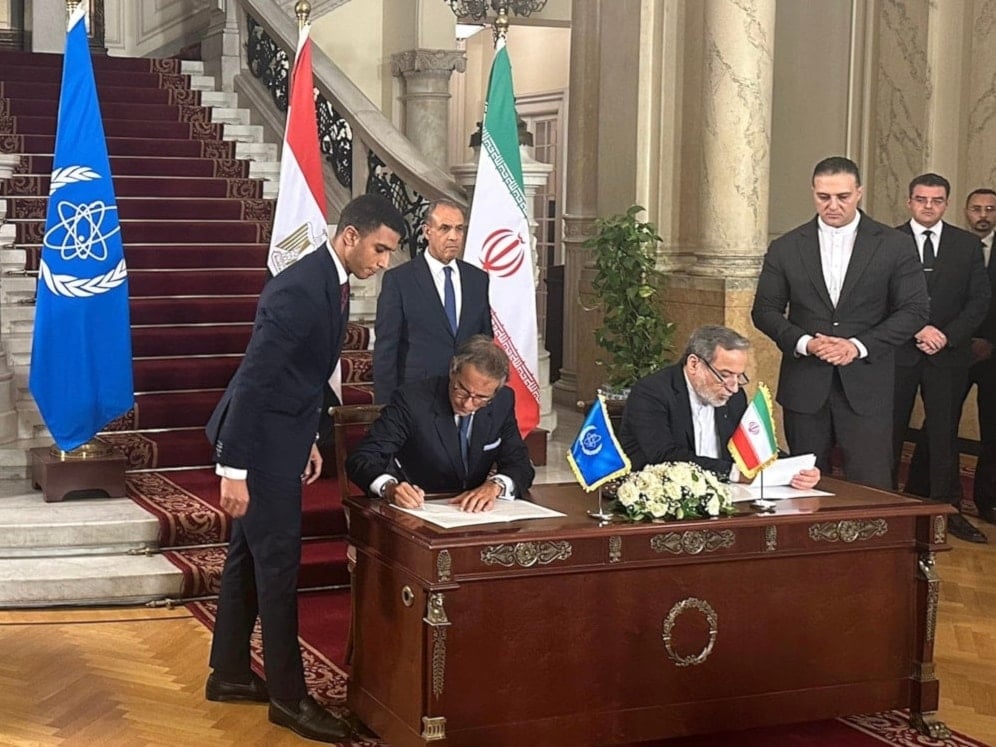Iran, IAEA sign agreement in Cairo to resume nuclear inspections
Iran and the IAEA signed a new cooperation deal in Cairo, mediated by Egypt, aimed at restarting inspections amid snapback sanctions.
-

Iranian Foreign Minister and the Director General of the International Atomic Energy Agency sign a new agreement to resume nuclear cooperation between the two sides, September 9, 2025 (X, @iraninarabic_ir)
Iranian Foreign Minister Abbas Araghchi and International Atomic Energy Agency (IAEA) Director General Rafael Grossi signed a new agreement on Tuesday to restart nuclear cooperation during a trilateral meeting in Cairo with the participation of Egyptian Foreign Minister Badr Abdel Aaty.
Speaking at a joint press conference, Grossi said that both sides had agreed on practical mechanisms to resume inspection activities inside Iran. He later wrote on X: "This is an important step in the right direction, and we thank Egyptian Foreign Minister Badr Abdel Aaty for his commitment and participation."
Araghchi reaffirmed Tehran's readiness to cooperate with the agency but stressed that such cooperation must safeguard Iran's rights and sovereignty. He also issued a warning that in the event of military aggression or the re-imposition of sanctions, "any agreement would be considered null and void."
New framework after attacks on Iranian facilities
Iranian Foreign Ministry spokesperson Esmail Baghaei revealed that Tehran and the agency had reached a new understanding defining the framework for cooperation and communication under current conditions, particularly following the recent attack on Iranian nuclear facilities. "The new understanding sets out a formula for cooperation between Iran and the IAEA," Baghaei explained in an interview with state television, without disclosing its details.
The deal comes at a critical juncture. Only days earlier, the E3, France, Germany, and the United Kingdom, triggered the UN "snapback" mechanism under Resolution 2231, which could reinstate a wide range of sanctions on Tehran. Analysts suggest that the Cairo agreement may be part of Iran's attempt to restore monitoring swiftly, potentially blunting the political momentum behind the European push.
Mistrust rooted in past disclosures
Relations between Iran and the IAEA have long been strained. In June, Tehran unveiled intelligence files revealing years of covert coordination between Grossi and Israeli officials, which Iranian authorities argued undermined the agency's neutrality. Tehran has also accused the IAEA of compromising sensitive data that facilitated Israeli assassinations of Iranian nuclear scientists. Grossi has rejected these findings, insisting the agency is not mandated to issue political condemnations.
The mistrust deepened after the E3's activation of snapback sanctions in late August, which pushed Iran's parliament to submit an emergency bill calling for withdrawal from the Nuclear Non-Proliferation Treaty (NPT). While the measure has not yet been ratified, it marked a turning point in Tehran's posture, with lawmakers framing it as the "minimal response" to European actions.
Reset attempt amid uncertain future
Observers say that the Cairo accord is therefore seen as both a reset and a temporary truce. It represents Iran's willingness to engage constructively with the IAEA, but on the condition that its sovereignty and security are guaranteed. At the same time, it reflects Tehran's leverage: if sanctions are reinstated or if further attacks occur, cooperation could collapse overnight.
On a related note, Egypt’s prominent role in mediating nuclear talks not only reinforces its diplomatic posture but also lands a blow to "Israel," which recently froze its record $35 billion gas export agreement with Egypt.
Read more: 'Israel', US committed 'strategic mistake': Iranian FM

 3 Min Read
3 Min Read










